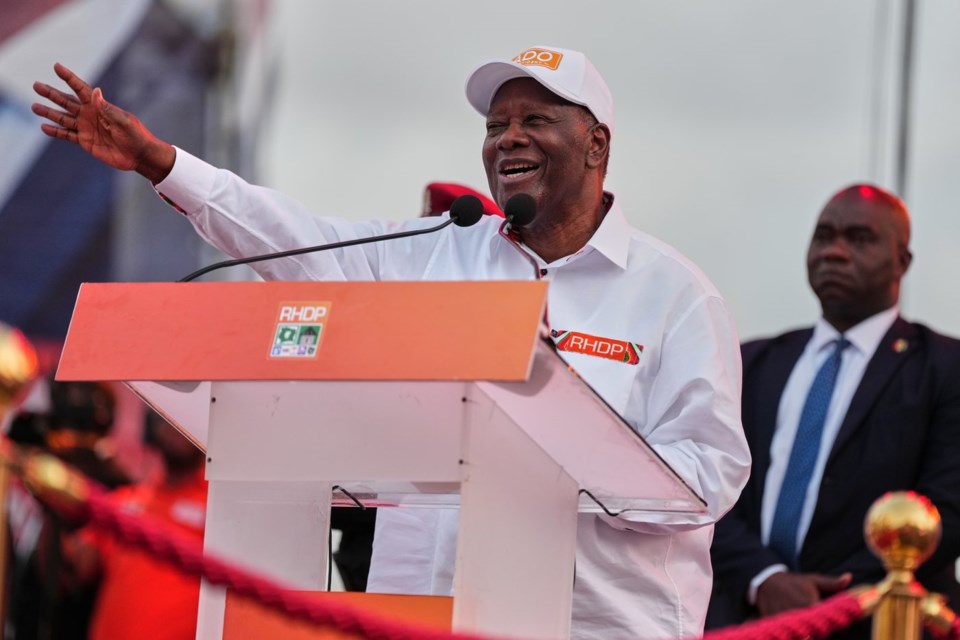Top Stories
Polls Open in Ivory Coast as Ouattara Pursues Fourth Term

Polls opened in the Ivory Coast on March 30, 2024, as incumbent President Alassane Ouattara seeks a fourth term in office. This election follows significant controversy, as several key contenders have been barred from participating, raising concerns about the fairness of the electoral process. Voting commenced at 08:00 GMT and is set to conclude at 18:00 GMT, with approximately 8.7 million registered voters.
Turnout in previous elections has been modest, with participation rates just above 50% in the last two contests. Following the closure of the polls, vote counting will begin immediately, with provisional results expected within 48 hours.
Political Landscape and Candidate Challenges
The political atmosphere in the Ivory Coast has been tense, with many viewing this election as a reflection of ongoing challenges in African governance. Ouattara, at 83 years old, leads a country that is a major cocoa producer. A victory would extend his presidency to nearly two decades, solidifying his long-standing influence.
While five candidates are vying for the presidency, analysts suggest that Ouattara remains the frontrunner. His party, the Rally of Houphouetistes for Democracy and Peace (RHDP), holds a significant majority in parliament, occupying 169 out of 255 seats. His administration has overseen economic growth, boasting an annual rate of 6% attributed to a cocoa boom. Yet, challenges remain, with 37.5% of the nation’s 30 million people living in poverty and high youth unemployment rates.
The election’s backdrop includes protests against the exclusion of major candidates like Tidjane Thiam, a former executive at Credit Suisse, and Laurent Gbagbo, a former president with considerable support. Their absence, coupled with government restrictions on public gatherings, has heightened tensions. Reports indicate that several hundred individuals were arrested during protests, with dozens jailed, raising fears of a repeat of the violence seen during previous elections that resulted in thousands of deaths.
International Reactions and Future Implications
Despite the unrest, Ouattara has received less scrutiny from the international community, particularly from France, the country’s former colonial ruler. Séverin Yao Kouamé, a research professor at the University of Bouaké, notes that current global priorities have shifted, potentially benefiting Ouattara’s campaign.
Challenging Ouattara are candidates including Simone Gbagbo, a former first lady, and Jean-Louis Billion, a former commerce minister under Ouattara. Each has promised job creation and new agricultural initiatives to appeal to voters. However, analysts remain skeptical of their chances against an entrenched incumbent.
At his final rally in Abidjan, Ouattara emphasized his administration’s accomplishments, stating, “The growth has been huge, but we need to continue.” His background as a former deputy managing director at the International Monetary Fund has contributed to his popularity, particularly for his investments in public infrastructure.
As the election unfolds, the international community will be watching closely, particularly given the historical context and potential implications for stability in the region. The outcome may shape the future of governance in the Ivory Coast and influence the broader landscape of leadership across Africa.
-

 Education3 months ago
Education3 months agoBrandon University’s Failed $5 Million Project Sparks Oversight Review
-

 Science4 months ago
Science4 months agoMicrosoft Confirms U.S. Law Overrules Canadian Data Sovereignty
-

 Lifestyle3 months ago
Lifestyle3 months agoWinnipeg Celebrates Culinary Creativity During Le Burger Week 2025
-

 Health4 months ago
Health4 months agoMontreal’s Groupe Marcelle Leads Canadian Cosmetic Industry Growth
-

 Science4 months ago
Science4 months agoTech Innovator Amandipp Singh Transforms Hiring for Disabled
-

 Technology4 months ago
Technology4 months agoDragon Ball: Sparking! Zero Launching on Switch and Switch 2 This November
-

 Education4 months ago
Education4 months agoRed River College Launches New Programs to Address Industry Needs
-

 Technology4 months ago
Technology4 months agoGoogle Pixel 10 Pro Fold Specs Unveiled Ahead of Launch
-

 Business3 months ago
Business3 months agoRocket Lab Reports Strong Q2 2025 Revenue Growth and Future Plans
-

 Technology2 months ago
Technology2 months agoDiscord Faces Serious Security Breach Affecting Millions
-

 Education4 months ago
Education4 months agoAlberta Teachers’ Strike: Potential Impacts on Students and Families
-

 Science4 months ago
Science4 months agoChina’s Wukong Spacesuit Sets New Standard for AI in Space
-

 Education3 months ago
Education3 months agoNew SĆIȺNEW̱ SṮEȽIṮḴEȽ Elementary Opens in Langford for 2025/2026 Year
-

 Technology4 months ago
Technology4 months agoWorld of Warcraft Players Buzz Over 19-Quest Bee Challenge
-

 Business4 months ago
Business4 months agoNew Estimates Reveal ChatGPT-5 Energy Use Could Soar
-

 Business4 months ago
Business4 months agoDawson City Residents Rally Around Buy Canadian Movement
-

 Business4 months ago
Business4 months agoBNA Brewing to Open New Bowling Alley in Downtown Penticton
-

 Technology2 months ago
Technology2 months agoHuawei MatePad 12X Redefines Tablet Experience for Professionals
-

 Technology4 months ago
Technology4 months agoFuture Entertainment Launches DDoD with Gameplay Trailer Showcase
-

 Technology4 months ago
Technology4 months agoGlobal Launch of Ragnarok M: Classic Set for September 3, 2025
-

 Technology4 months ago
Technology4 months agoInnovative 140W GaN Travel Adapter Combines Power and Convenience
-

 Top Stories3 months ago
Top Stories3 months agoBlue Jays Shift José Berríos to Bullpen Ahead of Playoffs
-

 Science4 months ago
Science4 months agoXi Labs Innovates with New AI Operating System Set for 2025 Launch
-

 Technology4 months ago
Technology4 months agoNew IDR01 Smart Ring Offers Advanced Sports Tracking for $169










